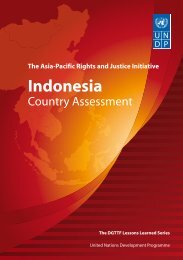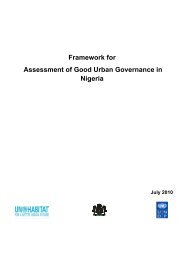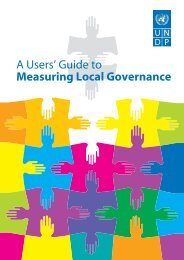planning a governance assessment - United Nations Development ...
planning a governance assessment - United Nations Development ...
planning a governance assessment - United Nations Development ...
Create successful ePaper yourself
Turn your PDF publications into a flip-book with our unique Google optimized e-Paper software.
4<br />
Section<br />
Types of Assessments<br />
Initial questions<br />
When trying to answer the questions posed in this section it is important to recognize the integral link between (1) the<br />
purpose of the <strong>assessment</strong>, (2) its content, and (3) its format and timetable of publication. The type of <strong>assessment</strong><br />
stakeholders choose to conduct will affect the type of data, the format of the results, the budget and the amount of time<br />
needed.<br />
First, stakeholders need to determine how the results will be used. Will the results be used by activists and advocats, by<br />
policy-makers and government officials, or by both groups? To inform specific policy interventions, research may have to<br />
be more detailed and require more questions, than if it is to be used for advocacy. Examples here may include data that<br />
can be used for monitoring or evaluation, or data that can be used for detailed policy <strong>planning</strong>. In contrast, <strong>assessment</strong>s for<br />
advocacy require clearer messages. Assessments for advocacy may also find difficulty in getting the government to lend the<br />
capacity and experience of the national statistical offices for such efforts. Instead, advocacy <strong>assessment</strong>s may need to rely<br />
on independent or academic research organizations. Below is a list of factors to consider before deciding on which type of<br />
<strong>assessment</strong> to use.<br />
• The purpose of the <strong>assessment</strong><br />
° Civic education/awareness raising<br />
° Influencing public debate<br />
° Monitoring and evaluating progress on <strong>governance</strong>, democracy and human rights issues over time<br />
° Agenda setting for reform<br />
• Programme evaluation<br />
• Do stakeholders want to compare the results against accepted benchmarks?<br />
° These can either be generated internally or by external actors<br />
° Do they want to be able to compare the results with those from other countries?<br />
• Type of <strong>assessment</strong> stakeholders choose to conduct (discussed below)<br />
• Sources of data used (discussed below)<br />
• Type of data collected (see Section 5)<br />
• Method of data collection (see Section 5)<br />
• Forms and levels of <strong>governance</strong> and types of Indicators<br />
° Are stakeholders interested in the de jure situation – the rules of the game as defined in laws and the constitution?<br />
° Are stakeholders interested in the de facto situation – the way <strong>governance</strong> is practice in everyday life?<br />
° Or are both the de jure and de facto equally important?<br />
° Should the macro (political institutions) and micro (citizen) levels of <strong>governance</strong> be examined?<br />
° Should they choose objective or perception-based indicators?<br />
° Will they develop a scale, an index or something else?<br />
Planning a Governance Assessment: A Guide to Approaches, Costs and Benefits<br />
11


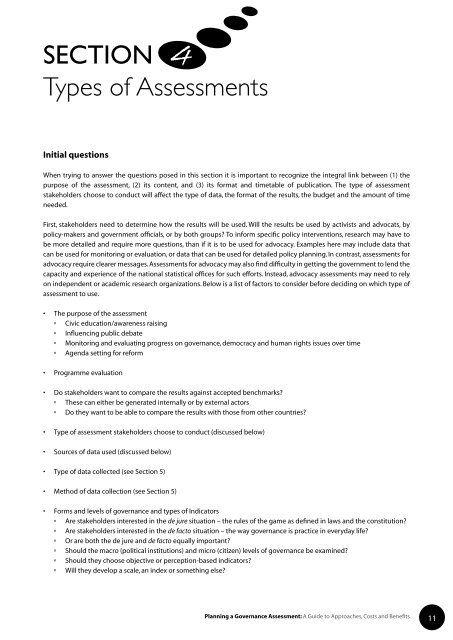

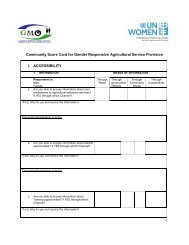

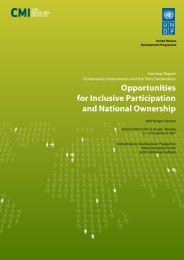
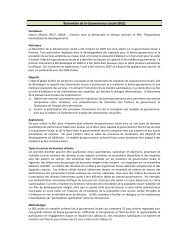
![GuÃa del Usuario ] - Governance Assessment Portal](https://img.yumpu.com/44740603/1/190x253/gua-a-del-usuario-governance-assessment-portal.jpg?quality=85)
